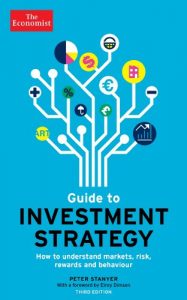Supported by numerous charts and detailed analysis, The Economist Guide to Investment Strategy outlines how to construct investment strategies appropriate for individual investors.
It looks at risk and comes with wealth-warnings for those who wish to explore more sophisticated and fashionable investment approaches, and it emphasises the importance of taking into account insights from behavioural analysis as well as the principles of traditional finance. It highlights how habitual patterns of decision-making can lead any of us into costly mistakes, and it stresses how markets are most dangerous when they appear to be most rewarding.
The book is in two parts:
The big picture
Setting the scene - including might I have been suckered by Madoff?
Understanding your behaviour - including why do we rely on lazy shortcuts?
Market investment returns - including who can investors trust to provide a safe haven?
How investor strategies evolve - including what has changed since the financial crisis?
The time horizon and the shape of strategy: keep-it-simple - including are government bonds and some equities all you need?
Implementing more complicated strategies
Setting the scene - including does an illiquid investment mean a premium return?
Equities - including are high returns just a reward for taking more risk ?
Credit - including do changes in credit spreads echo stock market volatility rather than bankruptcy risk?
Hedge funds - including when will investors routinely get decent hedge fund risk statistics?
Private equity - including are excessive fees strangling the goose that laid the golden eggs?
Real estate - including should I buy REITs or bricks and mortar?
Art and investments of passion - including how the Federal Reserve and the internet have boosted prices of fine art and classic cars.
In addition, there is a glossary and other useful appendices.






